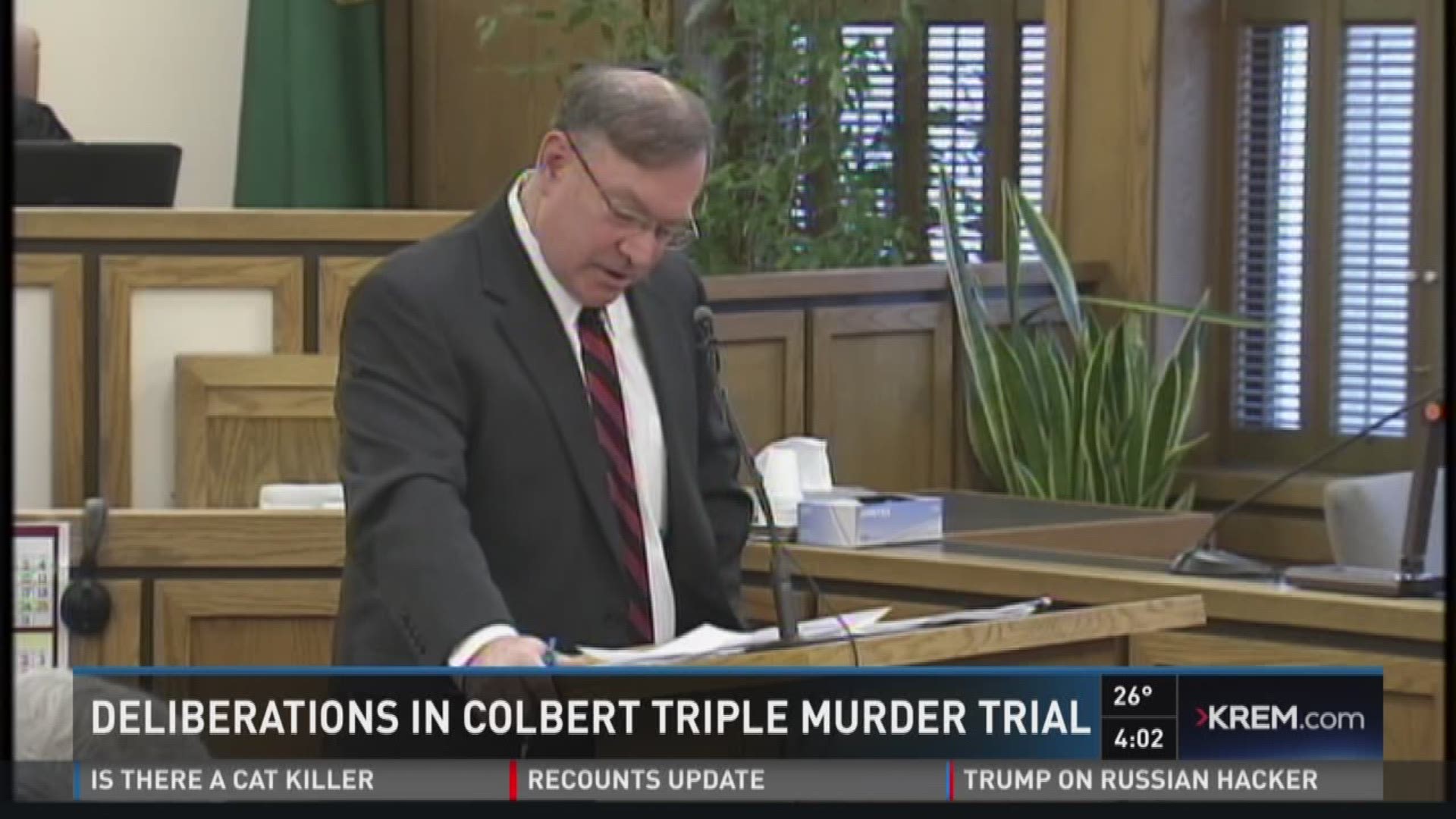SPOKANE, Wash. – A jury is now deliberating and deciding the fate of Roy Murry, the man on trial for the death of three people in Colbert in 2015. Closing arguments began on Monday.
Murry's fate is now in the hands of the jury. The prosecution painted a picture that this was a crime of hate and that Murry never got along with his ex-wife's family. The defense on the other hand said Murry was moving on with his life and that there is no physical evidence to tie him to the crimes.
Murry is accused of killing Spokane Fire Lieutenant Terry Canfield, his wife Lisa, and her son Jon Constable, and then setting their bodies on fire. Murry was married to Canfield’s daughter, Amanda.
Murry faces three counts of aggravated first degree murder, attempted first degree murder, and first degree arson. Murry has pleaded not guilty.
Spokane County Prosecutor Larry Haskell gave the closing statements Monday for the city. He said Murry thought his ex-wife Amanda was a plant for the Russian Secret Service and that she was the enemy. Haskell said Murry thought all Amanda wanted from him was information, quoting Murry when he said “I can no longer trust Amanda.”
Haskell said Murry thought Amanda’s family was part of it and said Murry accused Amanda’s family as being the “poison that drove her to him.”
Jurors saw a picture of a burner phone and a wedding announcement of Murry and Amanda that was found in the trash. Haskell said Murry is known to have burner phones.
In regards to the fire, Haskell said Murry’s internet history showed he was researching a chemical called Trioxane, which is used to start fires and was found at the scene, he said. Murry also posted music videos for songs on his Facebook page, Haskell said. One music video was for the song “Gasolina.”
Haskell said Murry’s phone and computer showed no activity during the relevant time and that it is not consistent with Murry’s normal habits.
Haskell argued that Murry “wanted to eliminate this family.” He said that Lisa Canfield was shot twice as many times as the others and had defensive wounds. Haskell said the killer took their time and may have even done some staging after the fact.
"There was pure hatred there and it was very personal," Haskell said, "and when you start evaluating who could've committed the crime, if you haven't decided or looked at that already you got to remember that Roy Murry had a special hatred for her because she was mom and mom was standing in the way of him and Amanda."
Haskell said Murry had the skills, training, equipment and opportunity to commit the crimes.
"And the twisted motive involving trust, loyalty, vengeance, anger, and frustration."
The defense however, said all the evidence in this case is circumstantial and that it is impossible for Murry to have left no DNA at the crime scene.
Defense attorney Tom Krzyminski began by explaining why Murry got off to a rough start with Terry Canfield and said it was because Terry did not like having guns in the house. He said that Murry was actually already moving on from Amanda because he was on dating sites. He said it was Amanda's choice not to bring up divorce with Murry and that Murry was moving on with his life. Murry and Amanda were separated at the time, he said.
Krzyminski brought up Murry's relationship with his first wife and said it shows that Murry understood when a woman tells him it is over, it is over and he moves on. He said that when the murders happened, Amanda did not ask Murry to come be with her.
Murry's lawyer said Murry was not even in town when the murders happened. He then posed a question to the jury, asking "how would you prove that you were somewhere home alone? What would you do?" He noted that many during jury selection when posed with that question said they would talk to their neighbors. Krzyminski said no one questioned Murry's neighbors about whether or not he was home the night of the murders.
"Ladies and gentlemen, failure to show where you were at a give time doesn't make you guilty of this crime," Krzyminski said.
Krzyminski also challenged the police's assertion that Murry did it.
"Law enforcement took a who done it and turned it into a he did it," he said. Krzyminski said it was because Murry could not come up with an alibi.
Krzyminski asked if the jury was overwhelmed by the state's evidence or under-whelmed.
"if you're under-whelmed then it's not guilty," he said.
Jurors will deliberate until 5:00 p.m. Monday and then continue Tuesday if no verdict is reached.

